
Jessica Phillips
Jessica Phillips, who was recently seen as Marion in Priscilla Queen of the Desert, is back on Broadway in Leap of Faith, the new musical at the St. James Theatre about a con-man preacher who blows into a small Kansas town, where he spars with a lady sheriff. Based on the Steve Martin film of the same name, the Christopher Ashley-directed production boasts four-time Tony nominee Raúl Esparza as charismatic Jonas Nightingale and formidable singing actress Phillips as the sheriff, Marla McGowan. Last week I had the chance to chat with Phillips, whose Broadway resume also includes all three versions of The Scarlet Pimpernel as well as the Pulitzer Prize-winning Next to Normal and the 25th anniversary revival of Jesus Christ Superstar. The actress, who is the mom of two young boys, spoke about her road to Leap of Faith, which features music by Academy and Grammy Award winner Alan Menken, lyrics by Glenn Slater and libretto by Janus Cercone (screenwriter of the 1992 film) and Tony winner Warren Leight; that interview follows. (Read more about Jessica Phillips in the Playbill Vault.)
Question: Since we haven't spoken before, I thought we could go back to the beginning. Tell me where you were born and raised.
Jessica Phillips: Whoa! My whole life story? Do you have an hour or two? [Laughs.] Yeah, I'd be happy to. I was born in Nashville, TN. I am the oldest child — the first born of two educators. My dad was in graduate school getting his Ph.D. at Vanderbilt when I was born, and we lived there until I was eight. And then my dad took a job in Massachusetts at Holy Cross as a professor — a religion professor — and he moved the family up to Massachusetts. And so I spent the second half of my childhood in Central Mass.
Question: When did you start performing?
Phillips: Well, my mother would tell you I came out of the womb performing. [Laughs.] When I lived in Nashville, my parents took advantage of an arts program that the city offered, and I took tap lessons. I had performed in a Nashville ballet company. I took baton lessons and piano lessons. There was a large consortium of free and low-cost lessons in the arts in the city of Nashville at the time, and they just put me in everything that I was interested in and kept me very busy doing all kinds of things and singing in the choir, taking gymnastics. I was pretty active as a young child. Then, when we moved to Massachusetts, I started to pick and choose. I continued with gymnastics, and then, a few years later, after a few injuries, moved over into dance, and I studied dance intensely from about age ten on through college.
| |
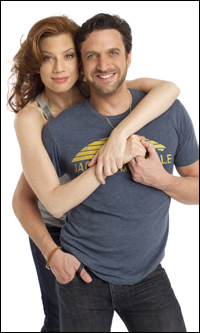 |
|
| Phillips and Raul Esparza | ||
| Photo by Joan Marcus |
Phillips: Well, I stayed on in the chorus, and somewhere around fifth grade, I took a summer arts camp that had a theatre-intensive. I got involved in that and really got interested in that. So somewhere around middle school, I was studying dance, I was in the choir and the chorus, and I was auditioning for plays after school. In high school my mother encouraged me to audition for the musical — the spring musica l— because she thought I could combine — I could marry — all of these disciplines in one because I was doing all of these things separately. I was like, "Ma, that's so dumb! That's not real acting. I'm not going to do that. I'm in the play — that's serious acting!" And then, of course, I was taking 15 or 16 hours of intense dance, and I was singing in the state in the national choirs, and she just really, at some point, convinced me to go ahead and give it a try, which I did. And, I was cast… I think my first musical was Very Good Eddie, and I realized from that point on that she was right — that I could combine all of these disciplines into one activity — one discipline — and I had a blast. I was bit. I was bit by the bug.
Question: Were there any singers or actors who influenced you? Anyone you admired?
Phillips: Well, I was pretty peripheral to the Broadway scene at that point… I was, at that point, so sort of consumed by my dance background that I really was focused on some of the big ballet dancers at the time. I was also a competition dancer, so I was in that scene — in the whole "Dance Moms" scene, if you can believe it. But then, I guess as I started in my college years… [I took] my first trip to New York, and I began to have more of an awareness of what was going on. And then, there were the traditional stars — the Bernadette Peters and the Tyne Daly and the sort of really big, unbelievable, impressionable divas— at that time. I was actually a late bloomer in that respect, so it wasn't until college that I began to learn about the history of the American musical and come to New York and see Broadway shows.
| |
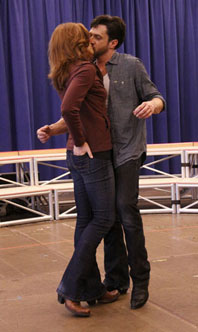 |
|
| Phillips and Raul Esparza in rehearsal. | ||
| photo by Joseph Marzullo/WENN |
Phillips: I saw Les Miz! [Laughs.] Is that boring or what? [Laughs.] I saw Les Miz and I saw Miss Saigon. Those were my first two, and then I saw The Who's Tommy. This was post-college now. The Who's Tommy was the first Broadway show I saw after moving to New York… I had just moved to New York. I was waiting tables — this is like two months in, waiting tables at Pizzeria Uno on the Upper East Side. I mean, talk about crazy… And, I was just stone-broke. Just broke… I was in a subletted apartment — a mouse-ridden subletted apartment — I opened my apartment door one day to go to work, and sitting in the hallway was a $100 bill. And, I looked around like, "Is this a joke?" I thought, "Did someone just walk by and drop this? Am I on camera right now?" So, as it turns out, I picked up this $100 bill that had literally fallen on my doorstep. And, I thought, "This is a sign because I have an audition tomorrow for a touring company of The Who's Tommy," and I had been thinking, "I really want to go see this because it's on the Broadway, and I want to see it." So I took that $100, I went down to the box office, and I bought myself a ticket to see The Who's Tommy, and then the next day I auditioned for the touring company, and I booked it. Isn't that crazy? The day after that or week after that, in my waitering shift at the restaurant, I actually served Jessica Molaskey, who was playing Mrs. Walker in the Broadway production that I saw the week before, and I thought, "Wow. This is really cool. All these events are coming together." So that was right after I moved to New York, and I booked that job, and I took it, so essentially, the first year-and-a-half I was in New York, I was out on tour.
| |
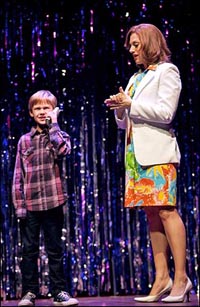 |
|
| Phillips and Luke Mannikus in Priscilla Queen of the Desert. | ||
| Photo by Joan Marcus |
Phillips: I debuted in The Scarlet Pimpernel.
Question: Which version?
Phillips: Version One. It was about six weeks before it got bought out, and I didn't know that at the time, so when I booked the job, my agent was like, "It's going to close, but at least you can get a debut." And, I thought, "Okay, awesome. It's all right. I'll take it for six weeks or however long it stays open." I went into the track that Sutton Foster had created in the ensemble in Scarlet Pimpernel, and then, when the news broke — when we all sat down for the pink-slip talk, we knew that the show was closing — we were surprised to hear that we were actually being bought out and reconceived and reproduced, and I was pleased to learn that I was being kept in the company to do this new version. So what happened was that I made my debut, I performed for six weeks — this Version One — then went back into rehearsal… We were rehearsing for two months one version — Version Two — but, at night, performing Version One in front of audiences. It was nutso! We were just living these parallel lives. I got to have this experience of not only debuting on Broadway, but also then creating an original cast in version two. At that time, I took over the understudy slot for both of the leading ladies, and that was really fun for me. I made my debut as a Broadway lead in Version Two across from Douglas Sills.
Question: Going back a little bit, do you remember that first night on Broadway — what that felt like?
Phillips: Yeah. It was totally surreal because in that track, that ensemble track, I had the very first line in the show. The curtain goes up, and then I yell out this line in French. That was my introduction to being on Broadway. It was really exciting and overwhelming and surreal. And, of course, as these things go, when you're a replacement, you essentially get thrown in. A lot of the numbers that I had rehearsed, I had never rehearsed with any of the other people in the company, so it was just kind of like trial-by-fire. It was a lot of shove-with-love that night — trying to make my way through the pattern of people, and I did it. And, by the time we got to the finale, I was two inches off from where I needed to be, and I just about got clocked by a big drop coming in on my head. [Laughs.] One of the ensemble members just scooped me up by the waist, and he moved me to where I needed to be so I did not get [killed] by the thing on my head. And then I burst into tears because it was such an emotional — it was such an exciting, emotional night. To nearly have my head taken off, it was just enough to send me over the edge. I spent my curtain call in tears of joy and exhilaration and excitement. It was really fun.
| |
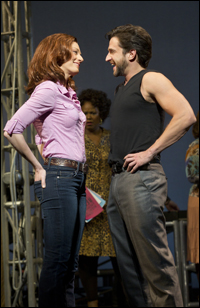 |
|
| Phillips and Esparza in Leap of Faith. | ||
| photo by Joseph Marzullo/WENN |
Phillips: Oh God, it was such an amazing and kind of divinely-inspired story because I was asked to come in and sit down to do the table read of the piece, and I do that kind of stuff all the time. We do it just essentially to get the piece heard and not as a means towards casting. So I sort of walked in, and I sat down with Raúl and a couple of other people on the creative team just to get the piece heard, and we all sort of felt the chemistry. Raúl and I had done some concert work together, so we knew each other, and we had a great connection. We were a lot alike in the way we attack material. We were sort of like peas and carrots in that room, and everyone felt it. So we did the table read, and then we all sat down and went, "Wow! That kind of worked. That was really exciting." The creative team then asked me to come back and sing for them because I didn't sing at this. This was just a reading of the book, and no one in the room had heard me sing, so they asked me to come back in. I sang "Long Past Dreaming," which is the ballad that Marla does in the second act of Leap of Faith. I had connected to that song when I heard it done by the music director in that room that day at the table read. And, I knew that it was something that spoke to me and that I could connect to.
The creative team and I really just clicked, and we sort of saw the piece in a similar way, and I think it just felt like it was a match. And then they asked me to do the reading last November, and that gave Raúl and I a chance to really kind of attack the material together, and I think what we discovered in the room during that week-and-a-half was that we really served each other, in that Raúl really needed ballast that I could provide because of the way I was coming into the role because the role connects with who I am in such an intimate way, and that was good for him. He felt he could really lean on me, and I really lean on Raúl to provide the motivation to fuel the intimacy of who Marla is. We found that we provided, as scene partners, what each other needed. And, as a result, it brought life to the characters. It brought life to the piece. Raúl felt safe with me as a scene partner. I was giving him what he needed to elevate his character to the next level, and he was doing the same for me. And, we have a similar process in terms of attacking the piece, and we were able to discover some things in there that were new.
| |
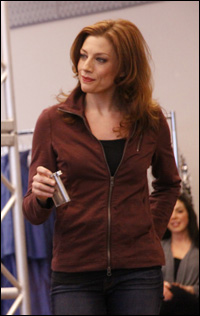 |
|
| Phillips in rehearsal | ||
| Photo by Joseph Marzullo/WENN |
And, I think what's interesting… about what Raúl and I were doing in terms of book-ending the creative process, of mounting the piece during the workshop time, was that I was coming in with a completely blank slate. I was coming in with a fresh, empty canvas of ideas for what this piece was saying and how these characters related to each other. And, Raúl was bringing in five, six years of history — of his character and the rest of the piece — and so we were able to come at it from these opposite directions and serve each other that way. It was so exciting for me to come in and hear him talk about the history of his character and in past versions what his character looked like and what the journey of the piece looked like for him, and, likewise, he was able to listen to my questions about some of the new and different and fresh ways that I was coming into the piece and say, "Oh, wow. I had never asked that question before. I had never looked at it that way before." We were really able to serve each other as actors, in that way, by coming at it from these opposite directions, and we were really, I think, able to help the entire creative team see new ways of approaching the piece and telling this story that were new and fresh and poignant.
| |
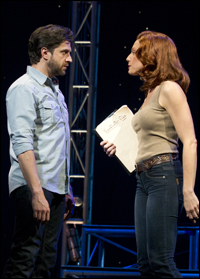 |
|
| Phillips with Raul Esparza in Lep of Faith. | ||
| photo by Joan Marcus |
Phillips: You know, my heart breaks for Marla because she is so complicated in her grief about the responsibilities that she carries in her life. I mean, she's a single mom, she's a widow. She lost her husband and was left with a child who is permanently disabled. Her life changed. Her life became unrecognizable in those moments for her. As a result, she threw herself into a caretaking role. She took on this job as a sheriff, so she takes care of the town and the townspeople. And, she threw herself into a parenting role knowing that she and Jake, her son, are all that they have. They are the family. My heart aches for Marla in this understanding of her very deep responsibilities and her passion for caretaking. And, at the same time, she does it with aplomb. She takes all this responsibility on as a way of finding levity in her own grief. She takes it on with passion because this is living for her, and she finds humor in it. She finds levity in it. She feels, I think, worthwhile as a woman. She feels like she is fully living her life in this way by throwing herself in. You might use the term workaholic, you might use the term overly-protective, but really, as we see in many people who throw themselves into their lives passionately after a crisis, she's really finding herself through this work. She's really discovering who she is in this new stage of her life, and it's a beautiful thing to watch in the character. It's a beautiful thing for me to observe how she navigates this new chapter of her life, and when we see her — when we meet her on stage — she is just at that point in her life where she is ready to turn to the next chapter. She has been pointed toward a new stage of healing and belief and faith and understanding of herself and of her relationship to Jake and her role in the town. We see her at the precipice of taking that next leap in healing and self-understanding.
Question: You're also a mom of boys. Do you feel that has helped you connect with the character?
Phillips: Oh, without any doubt… I hear Jessica's words coming out of Marla's mouth. I hear myself when I address Jake — I slip into my personal mom voice. While I have a healthy disconnect to the fact that I'm not Marla and she is not me, and this is a fictional character, absolutely I draw on my own experiences and my own relationships with my sons. I have an 11-year-old son, and Jake is 12, so it's a remarkable parallel in terms of my ability to understand what level of sophistication we can communicate on… Children evolve through these stages quickly enough that you have different levels of sophistication, and you're communicating as each stage goes by. It's a really exciting thing to be able to know exactly what level of dialogue I can have with Jake because I'm having that same dialogue at home with my son whose name is Jonah. [Laughs.]
| |
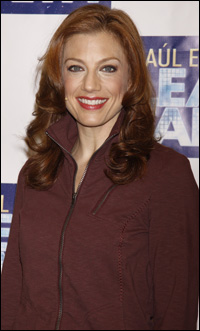 |
|
| Phillips at a March 8 press event | ||
| Photo by Joseph Marzullo/WENN |
Phillips: I have, in my life, been very fortunate enough to be in stages where I'm only running a show. I've been in stages where I've been a full-time mom between shows, and I'm obviously now in this stage mounting a show, where I'm in rehearsal all the time. And, I find that the old adage is true in that it's not about the quantity, it's about the quality of time, and it's about the level of understanding that my children have with where I am in the stage of my work. Of course, it's difficult to juggle, as I'm sure it's difficult for a woman who is a doctor, who has to juggle her on-call schedule, or a woman who has to be in court as a lawyer. I think that mothers across the board can probably relate to the fact that it's hard to switch gears sometimes… "Oh gosh! My children have a science fair project. I've got to get to that, except that I've got a big deadline at work." It is hard to juggle those things, but I find that what's effective for me is to say, "Wow. I've got this hour-and-a-half that's free. I'm going to only just spend it with my kids right now. Let's just go and have a dinner together." And, that hour-and-a-half is quality time. And, that goes a long way. It goes a long way in saying, "Okay, I'm really busy right now, but we're really just going to sit and connect, and that's going to get us through." Plus, as I said before, my children have an awareness of where I am in the stage of my work, and they know that this is a really busy time for me, and when we can sneak an hour together, that's really exciting for all of us. They'll come to my dressing room, we'll grab a meal, and that feels really satisfying to all three of us. And, I find that they are very sophisticated in their ability to understand, "Mom is in ten-out-of-twelves right now, so we're not going to see her a lot." But that has an end point. At a certain point, I'm not going to be in previews anymore. At a certain point, I'm only running, and we get into a predictable schedule, and then we know, "Okay. Well, I'm taking you to school in the mornings. I'm picking you up from school in the afternoons. We have dinner, and then I go to work." That then shifts us into a new framework of spending time together and of regular life. They understand it, and they can be flexible, and they understand the whole shifting of schedules as this thing gets mounted.
Question: How did the first preview of the show go?
Phillips: It was amazing. We had a sort of clunky invited dress. We had an amazing first preview. And, I think, quite frankly, we have an enormous show, and it's a beautiful show with huge production numbers, and when you're mounting something that engages all of the senses — big, big group production numbers with huge amounts of choreography. We have a 19-piece orchestra. We have a huge set, lots of beautiful costumes. It engages all of the senses. The important element that's necessary to complete the picture is feedback from the audience, especially in this piece where we've invited the audience to participate in an actual tent revival. It's an interactive piece. We lean on the audience to give us that energy back in the same way that you would experience that in an actual tent revival. I know that may sound scary to some of your readers. [Laughs.] They may say, "Oh, wait. I don't like to participate in shows." I'm one of those people, too, and Raúl was talking about it on the radio yesterday. It's like, "Oh, that feels kind of creepy to want people to interact." But I think you'll find, when you sit in this [tent] revival, that it's a palpable energy that goes through the audience, and it's really feeling like you're inside of the play in a way — not put on the spot, but just feeling like a part of what's going on onstage. And, the first preview was a beautiful example of people just being really excited to participate and the company on stage feeling that energy coming at them and being fueled by it.
Question: Last question: Tell me a little bit about working with director Chris Ashley.
Phillips: Well, first of all, I don't know that I've met another man with such a brilliant ability to multi-task. This man is so bloody smart. He can simultaneously look at a scene with delicate character work and also the bigger picture of the entire arc of the play and how the production elements fit into all of it. He has this incredible ability to see everything all at once. So I can tell you that, along with everybody in the company, I feel that I am totally safe in his hands. I have no doubt that he knows where we're going. And, of course, the preview period is about sussing out what needs to fixed — what needs to be tweaked, what isn't working, how we can make cuts, how we can augment. We're definitely in that mindset of, "Okay, what changes can we make to improve our piece and get it ready for opening?" And, I have no doubt that he is the man for the job. This is an enormous piece with lots of different things to look at at once, and he's the man for the job. We totally feel like we have a fearless leader in Chris Ashley.
[Tickets are available through www.telecharge.com, (212) 239-6200. Ticket prices range from $47-$137. Visit www.leapoffaithbroadway.com.]
Well, that's all for now. Happy diva-watching! E-mail questions or comments to [email protected].










